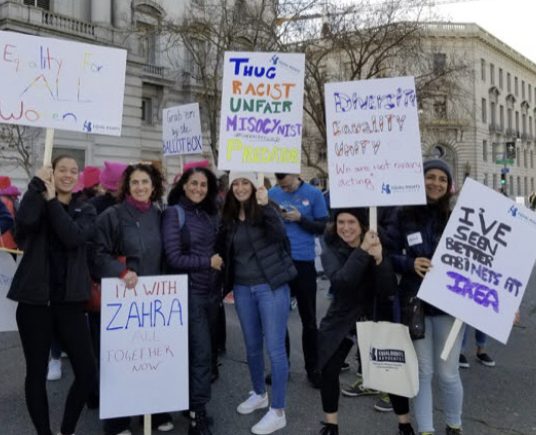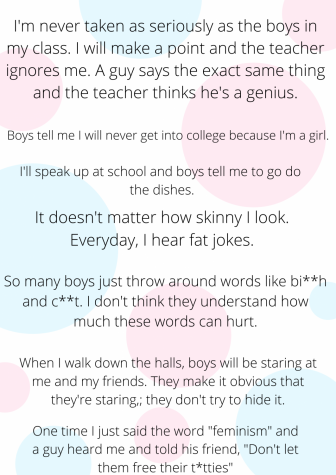
In 1972, the Nixon administration introduced Title IX, whose purpose was to prevent sexual harassment and assault in schools. For decades, schools seemed to be getting safer. But now, protections that once seemed secure are under attack.
President Donald Trump appointed controversial figure Betsy DeVos as his secretary of education. After a few months on the job, DeVos didn’t completely repeal Title IX. However, she changed the definition of sexual assault and discrimination on the basis of gender.
According to lawyers and women’s rights activists, this policy was unlawful because it discriminated against women and girls at their schools. Lawyers like Jennifer Reisch from the organization Equal Rights Advocates have filed long and pricey lawsuits against DeVos to change Title IX back to the original terms.
“In September 2017, we were asking the court to find that the policy was unlawful and discriminatory because it was based on discriminatory beliefs about women and girls,” Reisch said.
To understand the significance of this rollback, one must look at the reason this law originated. Reisch explained that inequality on college campuses resulted in the creation of laws by the Nixon administration to protect the nation’s female students.
“Many people associate Title IX with sports because that’s what opened this case up,” Reisch said. “Female athletes playing college sports did not receive adequate funding from the state because they were women. Additionally, this new policy forced schools to address sexual harassment, sexual assault, and rape to ensure equality between the sexes.”
Reisch made it clear that it wasn’t easy to get schools to take action against high school and college boys who harassed and even assaulted their female peers. Her point was validated by over a dozen girls from Carlmont High School who anonymously told their stories of dealing with aggression from their male peers.
“A boy would keep grabbing my butt in class,” Jane Wilson* said. “I told him to stop every day, but he wouldn’t care. The teacher would see it too, but she didn’t care. I told my counselor about it, and she told me to tell the administration. The administration treated it like a joke; they said they would talk to this boy but I don’t even know if they did anything.”

This experience is very common for high school girls. In fact, 51% of high school girls have been sexually assaulted by a peer at least once; however, less than 40% of these cases have been reported. But, these statistics are being combated by members of Carlmont’s administration like Vice Principal Gregg Patner.
“There’s all these different levels to it, so before we make any judgement about what may have happened, because that’s a pretty significant accusation, we want to gather all the right information from everyone who was involved,” Patner said. “Then we contact police officers and pass the situation off to them. On our end, we want to make sure everyone is safe, secure, and able to receive an education.”
He also mentioned that the Title IX restrictions do not affect how Carlmont deals with the victim and bringing justice to the survivor.
“Nothing has changed at all. We want to make sure that people are safe, they feel good about coming here, and they feel good about who they are because that is our job,” Patner said.
In addition to these comments made by Patner, Carlmont’s website describes how these issues are dealt with. They state that they have a zero-tolerance policy for sexual misconduct and sexual assault on campus. Also, the website says the perpetrator of sexual assault and rape can face punishment from the San Mateo County Sheriff’s Department. However, Susan Smith* believes that these are simply words that will not result in action.
“All over campus, I see signs that talk about a zero-tolerance policy,” Smith said. “I just feel like that isn’t true. When something happens to me or my friends, we want to go to the administration, but we are sure nothing will happen to the guy. I’ve never seen anything happen to the guy. It almost feels like we are invisible.”
With an understanding of the consequences students face without Title IX, Reisch and Equal Rights Amendment’s (ERA) legal team wasted no time in filing a lawsuit against DeVos. Along with a number of organizations across the country, they called for DeVos to bring the original rules of Title IX back.
“In January of 2018, we filed a lawsuit against Betsy Devos on behalf of six plaintiffs including ERA,” Reisch said. “Our argument is that you can’t make policies based on false or nonexistent facts. The policy changes are unfair and are actively causing harm to survivors of sexual assault, so we had no choice but to take action.”
Among the policy changes was a requirement for K-12 schools to ignore accusations of sexual misconduct and even sexual assault. Boys accused of these actions even got special privileges such as police protection on campus and the ability to directly question the plaintiffs in court. When news of ERA’s challenge to these harmful policies gathered international attention, their lawsuit received an outpouring of support.
“On the ERA website, we asked for public comment prior to our court hearing date,” Reisch said. “In very little time, we received over 100,000 comments from both men and women who were concerned for current and future students.”
Despite the overwhelming support from the public, the court was in favor of the new Title IX policies.
“In November 2019, a federal judge dismissed our lawsuit saying that the Trump administration’s policy changes did not produce legal consequences. The judge dismissed the case on finality grounds, rather than reaching the merits of plaintiffs’ claims, so the door is open to mount a challenge to this ruling in the future,” Reisch said.
And it is likely that this ruling will be challenged in the near future. Women’s rights activists are concerned by the correlation between the 2017 policy change and the 37% drop in the number of reported cases of sexual assault that happened only a few months later.
With this major setback to their case, Reisch leaves it up to high school and college administrations to protect their students.
“Right now, survivors of sexual assault have the burden of not only proving what they said is true and credible but also overcoming the presumption that what happened is false,” Reisch said. “Now, more than ever, schools need to be taking responsibility for ensuring an equal, healthy, and safe environment for everybody. These actions shift the burden and ensure students that the only thing they have to worry about within school walls is learning.”
*Due to the sensitive nature of the content, this name has been changed to protect the anonymity of the source.













Abby Meyer • Feb 9, 2020 at 1:21 pm
Excellent , thoughtful article on a very important subject.